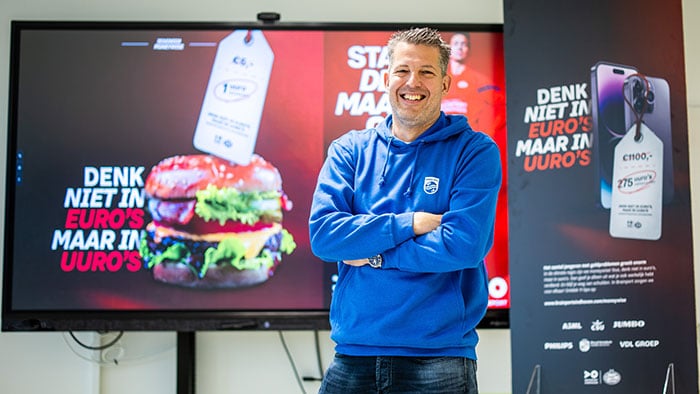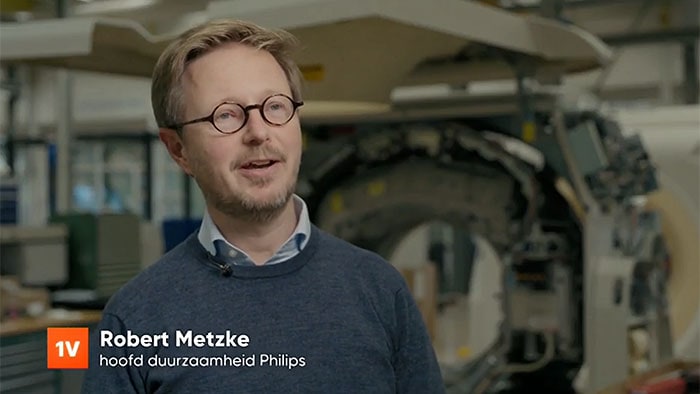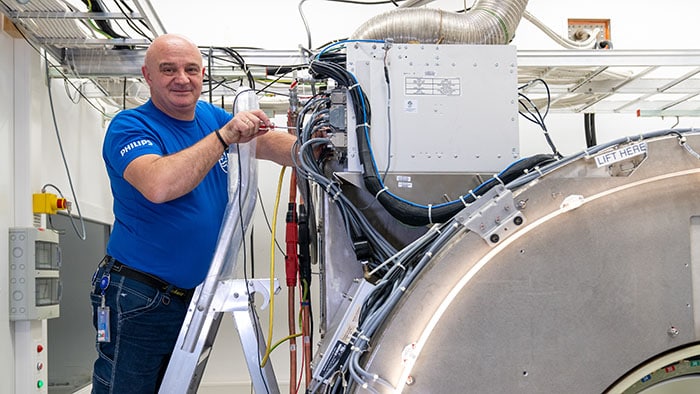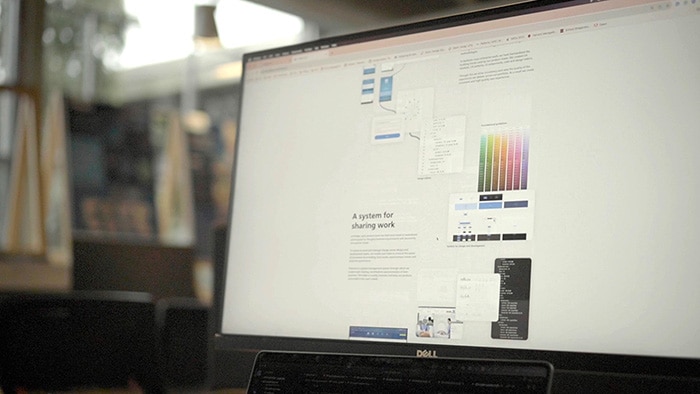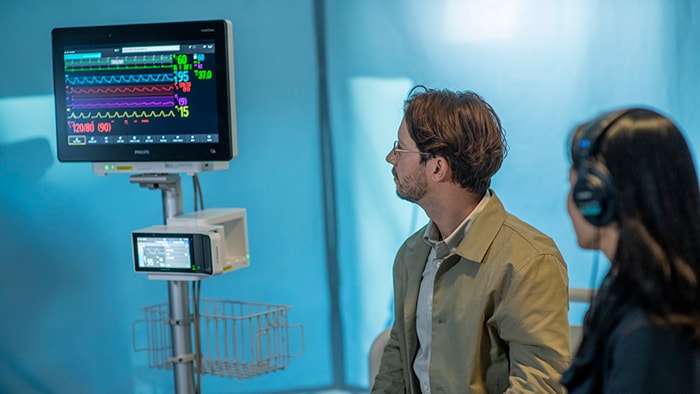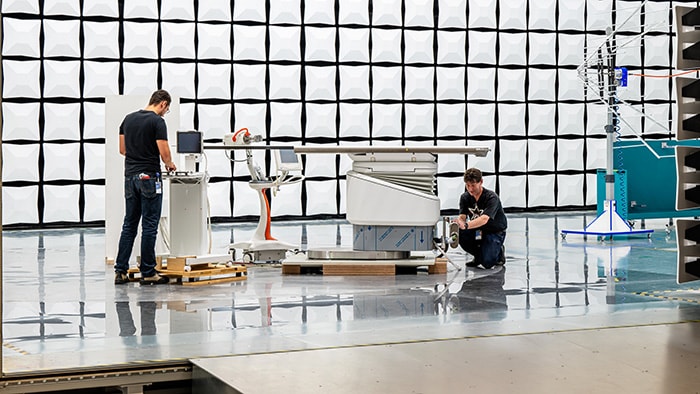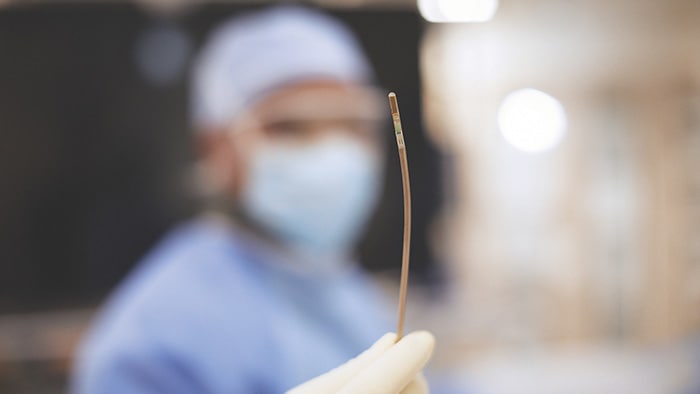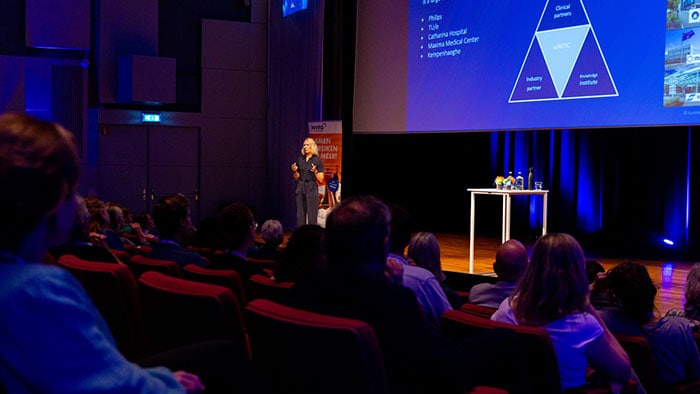For English see below
De wereld zoals we die kennen, verandert snel. Sterker nog: continue verandering is de enige zekerheid die we hebben. Philips Design volgt deze veranderingen door voortdurend onderzoek te doen naar trends en bewegingen in de gezondheidszorg. Het blijft echter moeilijk om te voorspellen wat er zal gebeuren en wat de impact zal zijn. Bij Philips Design hebben we daarom volgens onze Design Probes-methode samengewerkt met een team van studenten van de TU/e en Design Academy om inzichten te verwerven in de toekomst van de gezondheidszorg. Deze inzichten delen we tijdens de expositie ‘Chronic Health, if not us, then who?’ in de Embassy of Health, tijdens de Dutch Design Week Eindhoven, nog tot 29 oktober in het Innovation Powerhouse op Strijp-T.
Misschien voel je je ongemakkelijk, misschien maakt het je blij. Maar het maakt ongetwijfeld iets bij je los en dat is precies de bedoeling.
Geert Christiaansen
Senior Director Design Innovation.
De studenten creëerden samen met experimental designer Frank Kolkman op basis van verschillende mogelijke toekomsten zogenaamde ‘design probes’. Geert Christiaansen, Senior Director Design Innovation: “Met de uitkomsten daarvan bieden we je een blik op een mogelijke toekomst, die je tijdens de expositie zelf kunt voelen en ervaren. Dit kan storend zijn, maar ook hoop geven. Misschien voel je je ongemakkelijk, misschien maakt het je blij. Maar het maakt ongetwijfeld iets bij je los en dat is precies de bedoeling.”
De centrale vraag daarbij is steeds: waar blijft de menselijkheid? Je merkt dat bezoekers vooral dat heel belangrijk vinden.
Nesrin Güneş
Een van de meewerkende studenten.
Discussie
Nesrin Güneş, een van de studenten die meewerkte, herkent dat. “Wij werkten met een groepje aan een toekomst die we ‘Post Human’ noemen. Daarin gaat het niet meer om een gezondheidstoestand, maar om het brein. Stel dat je je brein kunt uploaden? En moeten we dat wel willen?” Zelf neemt ze daarin een neutrale houding aan, het gaat haar juist om het op gang brengen van een discussie. “En dat lukt. Mensen die elkaar niet kennen, gaan hier al samen het gesprek aan. De centrale vraag daarbij is steeds: waar blijft de menselijkheid? Je merkt dat bezoekers vooral dat heel belangrijk vinden.” Frank Kolkman, die de vier groepen studenten begeleidde, is onder de indruk van Güneş en haar medestudenten. “Ze hebben de vier verhaallijnen die we hadden uitgewerkt niet alleen heel snel opgepikt, maar ons als ervaren designers ook uitgedaagd om verder te denken. Als dat gebeurt, weet je dat je iets goeds op het spoor bent.” Zelf heeft Kolkman er bovendien van genoten om met studenten samen te werken. “Het gaat hier over de toekomst. En die toekomst, dat zijn zij.”
Expositie bezoeken
Zelf ontdekken wat de vier verschillende toekomstbeelden van Philips Design met u doen? De Embassy of Health is tot 29 oktober elke dag geopend in het Innovation Powerhouse, Zwaanstraat 31 A in Eindhoven. De openingstijden zijn van 11.00 tot 18.00 uur. De expositie is toegankelijk met een passe partout van de Dutch Design Week. Meer informatie is te vinden op de pagina van de Embassy of Health.
Over Embassy of Health
De Embassy of Health is een platform voor het verkennen van nieuwe, persoonsgerichte manieren voor het aanpakken van uitdagingen op het gebied van gezondheid en welzijn op basis van design thinking en design research. Het unieke samenwerkingsverband tussen zes Nederlandse organisaties - VanBerlo, Waag, Philips Design, Maxima Medisch Centrum, Dutch Design Foundation en U CREATE – brengt uiteenlopende perspectieven bij elkaar op het cross-over gebied van technologie, design, wetenschap, kunst en gezondheidszorg. De eerste uiting van de activiteiten van de Embassy of Health was de tentoonstelling getiteld 'Chronic Health: Designing a Healthy Future' tijdens de Dutch Design Week 2017, ondersteund door WDE en DDF. De Embassy of Health stimuleert creatief en disruptief denken om burgers, patiënten, zorgprofessionals en beleidsmakers te ondersteunen in hun rol om de mogelijkheden van design voor de toekomst van de zorg te begrijpen en te vervullen. De ambassade is een open platform voor participatie in de zorg, en cross-over samenwerkingen in de gezondheidszorg. Het startpunt voor ontwerpen in de zorg is empathie; het vermogen om te zien en te ervaren door de ogen van een ander. Op die manier ontwerpen we zinvolle producten, diensten, ervaringen en systemen die persoonsgericht zijn. Daarnaast is de ethiek van ontwerpen voor de zorg een aandachtspunt voor de ambassade.
Philips Design and Embassy of Health show future of healthcare during Dutch Design Week
The world is changing rapidly. In fact, continuous change is the only certainty we have. Philips Design follows these changes by continuously researching trends and movements in healthcare. However, it remains difficult to predict what will happen and what the impact will be. Using our Design Probes method, we worked with a team of students from the TU/e and Design Academy to gain insights into the future of healthcare. Our conclusions are on show until 29 October at the Embassy of Health, located in the Innovation Powerhouse at Strijp-T., Eindhoven. The exhibition is called, 'Chronic Health: if not us, then who?'
This can be disturbing, but it can also give you hope. Maybe you feel uncomfortable or maybe it makes you happy. But undoubtedly it will trigger something in you which is exactly the intention.
Geert Christiaansen
Senior Director Design Innovation.
Along with the experimental designer, Frank Kolkman, the students created so-called 'design probes' based on different possible future scenarios. "Our results give a look into a possible future, which you can feel and experience yourself during the exhibition. This can be disturbing, but it can also give you hope. Maybe you feel uncomfortable or maybe it makes you happy. But undoubtedly it will trigger something in you which is exactly the intention,” Said Geert Christiaansen, Senior Director Design Innovation.
The central question that remains: where does this leave humanity? This was the crux of the debate for the visitors.
Nesrin Güneş
One of the participating students.
Discussion
Nesrin Güneş, one of the students who participated in this project recognizes that; "My group worked on a future that we call 'Post Human'. We focused not on a state of health but rather about the digital possibilities of the brain. What if you can upload your brain to a digital platform? And would we even want that?” For Güneş the key was for the project to spark a discussion. "And it is working. We’ve seen strangers debating this very topic. With the central question remaining: where does this leave humanity? This was the crux of the debate for the visitors.” Frank Kolkman, who supervised the four groups of students, was impressed by Güneş and her fellow students. "They not only quickly picked up the four storylines we had worked out, but also challenged us as experienced designers to think differently. You know you are on the right track when that happens.” For Kolkman the opportunity to work with these students was an enjoyable one: "This exhibition is about the future and they are our future.”
Visiting the exhibition
Do you want to discover for yourself what these future perspectives of Philips Design will do to you? The Embassy of Health is open every day until 29 October in the Innovation Powerhouse, Zwaanstraat 31 A in Eindhoven. The opening hours are 11AM to 6PM and you can access the exhibition with your Dutch Design ticket. More information can be found on the website of the Embassy of Health.
About Embassy of Health
The Embassy of Health is a platform for exploring new, person-centred and design-driven ways and of tackling challenges in health and wellbeing. As a partnership between six Dutch organizations – VanBerlo, Waag, Philips, Maxima Medisch Centrum, Dutch Design Foundation, and U CREATE– we bring together diverse perspectives that include technology, design, science, the arts and front-line healthcare. The first physical manifestation of our activities was an exhibition entitled ‘Chronic Health: Designing a Healthy Future’ at the Dutch Design Week 2017. The Embassy of Health stimulates creative and often disruptive thinking to help health professionals, policymakers, patients and the general public understand and fulfil their roles in the healthcare possibilities of the future. It is an open platform that welcomes broad participation and stimulates crossover collaborations in healthcare for now, near future and future. A common design criterion throughout each one is empathy; the ability to see and experience through the eyes of another in order to design meaningful and appropriate products, services, experiences, and systems that always have a strong person-centred dimension. Next to that the ethics of future health design is a major point of interest to the Embassy.




